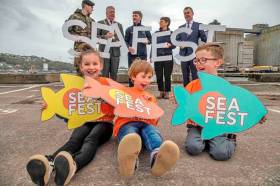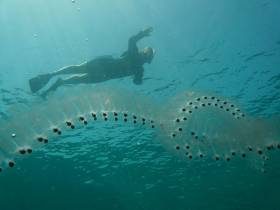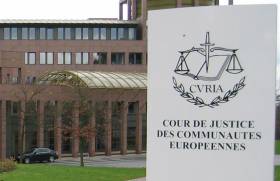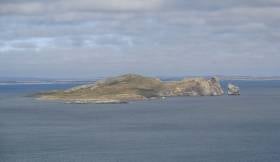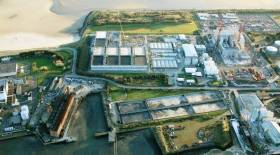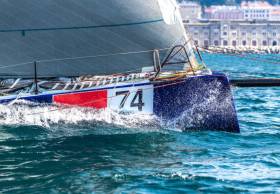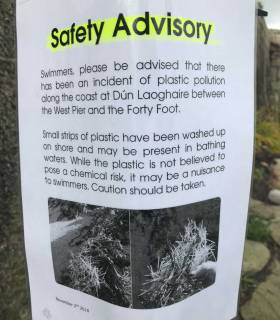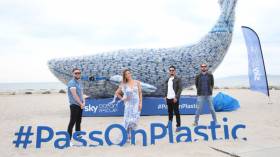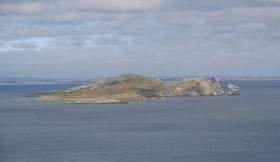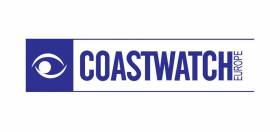Displaying items by tag: pollution
Sea Change At Seafest: Ireland’s Largest Free Maritime Festival To Raise Awareness Of Plastic Pollution
An interactive hut made up of 60kg of household plastics — the average amount used by an adult in Ireland each year — will be unveiled at SeaFest this weekend, highlighting the problem of plastics in our oceans.
Ireland’s largest free family-friendly maritime festival begins at the Port of Cork from today, Friday 7 June, and continues to this Sunday 9 June with over 100 free events celebrating our oceans.
More than 100,000 visitors are expected to attend SeaFest, which is presented by Cork City Council and the Inter-Departmental Marine Coordination Group (MCG).
Raising awareness of the need to protect our marine environment against plastic pollution, Bord Iascaigh Mhara's centrepiece at SeaFest is the Clean Oceans Experience.
Funded by the European Maritime and Fisheries Fund, the installation includes a 60kg plastic hut sculpture, representing the total plastic packaging waste produced per person in a year.
This installation will be accompanied by a specially commissioned artistic performance, Fantastic Fishermen Go Fishing for Litter, on how the fishing sector is reducing plastics in our seas.
Members of the fishing sector taking part in BIM's Fishing for Litter scheme, which encourages fishermen to take ashore waste they encounter at sea, have collected over 330 tonnes of marine litter since it began in 2015.
“Environmental stewardship of our oceans is something we need to instil in our children”
“Environmental stewardship of our oceans is something we need to instil in our children,” Lord Mayor of Cork, Councillor Mick Finn, said. “This will ensure the problems facing our oceans are addressed, and hopefully, reversed.
“I’m delighted to welcome SeaFest to Cork for the next three years, as it serves an important role in this education. SeaFest is a brilliant illustration of our unique and unrivalled maritime history.
“In a fun and interactive way, this national annual festival is helping those of all ages to think about their connection with the water and how the actions they make today can make a difference tomorrow.”
Engaging exhibitions and workshops to turn plastic into art also feature at SeaFest, open daily from 10am to 6pm.
A Flock of Sea Gulls will see 1,000 young visitors transform 1,000 plastic cartons into an installation of seagulls, while the Port of Cork and MaREI’s 3D exhibition, Maintaining a Healthy Harbour, is also on display, with marine litter artworks from local school children.
Showing how our oceans and climate are linked, the Marine Institute’s Wild Atlantic Theatre features talks from Met Éireann’s head of forecasting Evelyn Cusack and wildlife cameraman Doug Allan.
Doug, who has worked alongside Sir David Attenborough on BBC’s Blue Planet and Frozen Planet, will discuss how changing climate is affecting Earth's north and south regions.
Sustainably sourced Irish seafood plays a starring role at SeaFest
Sustainably sourced Irish seafood plays a starring role at SeaFest with demos from top chefs Nevin Maguire, Rory O'Connell and Martin Shanahan.
The Bord Bia and BIM Seafood Experience also features fishmongers Pat O’Connell and Hal Dawson on seafood preparation.
Encouraging responsible activity on the water, SeaFest will hold free sailing, kayaking, and currach boats sessions, along with interactive displays exploring the marine world.
Speaking ahead of SeaFest 2019, Marine Minister Michael Creed said: “SeaFest is part of Harnessing Our Ocean Wealth, the Government’s integrated plan for the marine sector. A key aspect of this plan is to significantly increase our level of engagement with the sea.
“As we welcome the festival back to Cork from Galway where it has been thriving over the past three years, once again, SeaFest has delivered a fantastic line-up of free, educational and fun events to engage both the public and policy makers alike and emphasise the importance of Ireland’s marine economy.”
Providing education on our oceans, the Marine Institute's RV Celtic Explorer is open to the public, following its oceanographic data collection voyage from Galway to Cork.
There will also be vessel tours of Commissioners of Irish Lights’ ILV Granuaile and tall ship Phoenix.
MFV Allanah Riley, a white fish trawler that fishes out of the port of Castletownbere, will be open to visitors throughout SeaFest. Its crew will be on hand to explain the sustainable fishing practices of the Irish fishing fleet.
Market traders will be using compostable packaging across the weekend
As part of Cork City Council’s commitment to green initiatives, Cork City Council environmental awareness officer Mary Walsh highlighted that market traders will be using compostable packaging across the weekend.
“There will also be pirates on site, keeping SeaFest free from single-use plastics. If someone has brought a plastic bottle with them, the pirate will show them how, and where, to dispose of it,” she said.
SeaFest 2019 is a culmination of a weeklong celebration of Ireland’s rich maritime heritage, as the annual Cork Harbour Festival runs until Sunday 9 June.
The Our Ocean Wealth Summit takes place in Cork on Sunday 9 and Monday 10 June. The summit will hear from global leaders including environmental activist and former US Secretary of State John Kerry.
To view the full festival programme visit SeaFest.ie. Follow SeaFest on Facebook, Twitter and Instagram and use the hashtag #SeaFest19.
SeaFest is proudly supported by Cork City Council, BIM, Marine Institute, Port of Cork, Cork Harbour Festival, Commissioners of Irish Lights, Defence Forces, Department of Agriculture, Food and the Marine, Department of Foreign Affairs and Trade, Bord Bia, Sea Fisheries Protection Authority, Pure Cork and by media partners Today FM and RedFM.
Seafest is co-funded by the Government of Ireland and the European Union under Ireland’s European Maritime & Fisheries Fund Operational Programme for the seafood sector.
Microplastic Consumed By Plankton May Interrupt Oceans’ Carbon-Capture Abilities, Says NUI Galway Study
Microplastic ingested by plankton may greatly impair our oceans’ natural carbon-capturing abilities, according to a new study from NUI Galway.
Marine scientists at the university’s Ryan Institute found that microscopic particles of plastic waste in the world’s oceans are interfering with the food chain that cycles CO2 from the surface to the floor, as The Irish Times reports.
The cycle involves the absorption of CO2 from the atmosphere by algae on the ocean surface via photosynthesis. This algae is a food source for zooplankton such as salps, whose faecal matter sinks to the ocean floor.
As much as half of all CO2 produced by humans over the last 200 years has been captured at the bottom of the world’s oceans in this manner, the scientists say.
However, the team have identified that when salps ingest algae along with microplastic particles, their excretions do not sink to the bottom as fast, and may be broken down closer to the surface to release more of their trapped CO2.
“It is very important to point out our study was carried out in a laboratory,” said Dr Tom Doyle of UCC, a partner in the research.
“We now need to go out into the field to further test our hypothesis by quantifying the abundance of microplastics found in salps and their faecal pellets in different areas of our oceans.”
The Irish Times has more on the story HERE.
Irish Wastewater Schemes Fall Foul Of European Court of Justice
Almost 30 sewage schemes across Ireland fall short of EU directives on wastewater treatment, as The Green News reports.
The European Court of Justice ruling from this past Thursday 28 March now means Ireland could be liable to significant fines if the problem schemes are not addressed.
Among the court’s findings were that Cork city’s strained wastewater treatment scheme was subject to more than 800 spillages of untreated sewage in 2015 alone.
Sensitive areas in Killarney, Longford, Dundalk and Tralee, among others, were also affected by untreated wastewater discharges for which the State has been reprimanded by European judges.
In addition, the State as found guilty of failing to provide for secondary treatment at a number of problem sites including Cobh in Cork Harbour, the fishing harbours of Arklow and Killybegs, and Ringsend in Dublin — the latter of which was the scene of a discharge of ‘activated sludge’ only a month ago.
The Department of Housing and Local Government says it has provided Irish Water “with the necessary resources to both tackle the deficiencies identified by the [ECJ] as well as providing the infrastructure which will underpin the future sustainable development of our country.”
Part of the State’s defence in this case were occasions of ‘unusually heavy rainfall’ that overwhelmed the country’s wastewater management systems.
Such conditions are also linked to the leeching of nitrates and phosphates from agricultural sites causing seaweed blooms in coastal areas, as highlighted by a recent academic report.
The news also comes after oral hearings began into a long-planned €500 million wastewater treatment scheme for North Dublin that faces strong local oppositions.
The Green News has more on the story HERE.
Planning Hearing On Clonshaugh Wastewater Plant Gets Under Way
Planners are from today set to review proposals for a controversial €500 million wastewater treatment scheme in North Dublin, as The Irish Times reports.
Clonshaugh near Dublin Airport was chosen in June 2013 as the site for the sewage ‘super plant’ before Irish Water took over the Greater Dublin Drainage project from Fingal County Council last year.
The new plant — second only to the Ringsend wastewater facility in scope — would be connected to a new orbital sewer to Blanchardstown, and an outfall pipe to eject treated wastewater in the sea north of Ireland’s Eye.
Plans for the new sewage processing plant have faced strong local opposition, both from residents adjacent to the Clonshaugh site and connected works and marine professionals concerned about potential environmental risks.
Last October, Howth-based ferryman Ken Doyle expressed his fears of the knock-on effect on fish stocks from any accidental contamination of the local waters from the outfall pipe.
The planning hearing began at The Gresham hotel in Dublin this morning, and The Irish Times has more on the story HERE.
EPA Investigates Wastewater Discharge In River Liffey
This past weekend’s discharge of wastewater in the River Liffey from the Irish Water treatment plant in Ringsend is being investigated by the Environmental Protection Agency.
As RTÉ News reports, failure of a processing tank at the locally controversial site led to the overflow, which Irish Water confirmed was from an outfall 1km from the plant in the Lower Liffey Estuary in Dublin Bay, around 9am on Saturday (23 February).
Irish Water says the discharge of ‘activated sludge’ — which “does not pose the same risk to public health or the environment as a raw sewage discharge would” — lasted for around 20 minutes.
But drone images captured on Saturday evening showed the persistence and extent of the pollution incident beside the Great South Wall.
The Ringsend wastewater treatment plant is reportedly running at 20% above capacity as it treats two-fifths of all wastewater in Ireland.
As such, its standard discharge “does not comply with the Urban Wastewater Treatment requirements”, according to an Irish Water statement which also confirmed that the EPA conducted an audit of the affected site yesterday (Tuesday 26 February).
Biodegradable Bow Stickers For Greener Racing
The scourge of bow stickers stuffing rubbish bins and polluting waters the world over could soon be a thing of the past thanks to a new biodegradable variant.
YachtRacing.life reports on the new stickers from race boat supplier PROtect Tapes, made from bioplastic film and designed to be durable enough for regattas of seven to 10 days.
There is also an existing short-term bow sticker for shorter events made of paper from sugar cane cellulose.
Both are made of compostable materials so they can go in the brown bin straight after racing — but if they come off while on the water they will degrade completely within a year.
The development will be good news for Martin Byrne and his fellow Dragon sailors, who raised the issue of plastic pollution from bow stickers at Volvo Cork Week this past summer.
Safety Advisory For Swimmers Over Plastic Pollution At Forty Foot
#Safety - Dun Laoghaire-Rathdown County Council has posted a safety advisory for swimmers in Dun Laoghaire over an incident of plastic pollution between the West Pier and the Forty Foot.
According to the local authority, “small strips of plastic” that have washed ashore in recent days may be present in bathing waters.
While the plastic poses no chemical danger, it could be a nuisance or at worst a physical risk to swimmers.
As The Irish Times reports, contractors working on the redevelopment of the Dun Laoghaire baths site are launching a clean-up operation in the affected area after “a quantity of fibres” was washed into the water during a concrete pour.
It follows community efforts led by local environmental hero Flossie Donnelly, who recently donated a second Seabin for cleaning surface debris in Dun Laoghaire Harbour to the National Yacht Club.
New Web Series Follows The Riptide Movement As They Discover The Impact Of Plastic In Our Oceans
The Riptide Movement’s Plastic Oceans is a three-part web series that hopes to add to the urgent and important debate about how to solve the global plastic crisis and the devastating effect it is having on our marine life.
The Clean Coasts programme took Dublin rock band The Riptide Movement along the incredible Irish coastline and met with some of Ireland’s leading marine biologists, researchers, campaigners and Clean Coasts volunteers to discover the real impacts of plastic in our oceans and what it means for the future of all life on our planet, including us.
The Clean Coasts programme engages communities in the protection of Ireland's beaches, seas and marine life and currently has over 650 volunteer groups working along our Irish coastline, carrying out beach cleans and coastal protection work.
The band also visit a number of locations leading the way in tackling plastic waste including University College Cork, a Green Campus awarded site; chatted with Amanda Byram at the launch of Sky Ocean Rescue in Ireland; and sat down with the Minister for Housing, Planning & Local Government Eoghan Murphy to see what actions the government are taking and what can be done to address the issue at policy level.
Regarding wildlife, a visit to Ireland’s only seal sanctuary and a panel discussion with filmmaker Sophie Darlington highlights the impact our love of plastic is having on our marine animals.
The result is a web series aptly titled ‘The Riptide Movement’s Plastic Oceans’. Narrated by Jerry Fish, this web series highlights the extent of the plastic crisis in Ireland in an informative, artistic and engaging way, whilst also showcasing the small changes we can make to help stem the tide of single use plastics.
Talking about the web series and the bands’ collaboration with Clean Coasts, lead singer Malachy Tuohy said: “We hope this web series and our music can help raise more awareness around one of the greatest environmental challenges of our time.
“Our reliance on single use plastics is destroying our oceans, a reality so poignantly highlighted by David Attenborough in Blue Planet 2. Through our web series we wanted to learn about the issue of plastic pollution here in Ireland and what small changes we can make to help stem the tide of single use plastics.
“Our oceans are drowning in plastic and it is not the legacy we want our generation to be remembered for.”
Speaking about the web series, Clean Coasts manager Sinead McCoy said: “Litter and particularly marine litter has a huge long term negative impact on our environment. Raising public awareness is incredibly important when it comes to reducing marine litter which we see washing up on our coastline on a daily basis.
“So, the Clean Coasts programme is delighted The Riptide Movement are using their influence to bring attention to not only the issue of marine litter but the incredible work being done by Clean Coasts groups and our Clean Coasts stakeholders.”
For more information on how to get involved in Clean Coasts programme see cleancoasts.org
#MarineWildlife - A Howth-based ferryman fears for marine wildlife on and around Ireland’s Eye when a planned sewage outfall pipe begins discharging wastewater in the area.
Ken Doyle of Ireland’s Eye Ferries tells Dublin Live that any accidental contamination of the waters from the pipeline, from Clonshaugh to a mile off the small island immediately north of Howth, could have a disastrous knock-on effect on fish stocks — an issue both for sea anglers and local bird and seal colonies.
Five years ago, Clonshaugh in North Co Dublin was chosen as the location for the capital’s wastewater treatment ‘super plant’.
The scheme will connect a 26km orbital sewer through counties Dublin, Kildare and Meath with an outfall pipeline ejecting waste off Ireland’s Eye.
Doyle noted that when the outflow of raw sewage at Howth Head was ended with the opening of the Ringsend treatment plant, improvements in water quality meant “the bird population increased hugely and it’s all positive but I wouldn’t like it to go back to like it was.”
He adds that he is not opposed to the wastewater scheme in principle — only that he and other local residents and businesses want assurances that the plant will not have any negative impact on the environment.
Wet Wipes Scourge of Irish Beaches In 2018 Coastwatch Survey
#CoastalNotes - Wet wipes are “in abundance” around the Irish coastline as the annual Coastwatch Survey draws to a close this week.
According to RTÉ News, citizen science volunteers taking part in the ‘eco-audit’ of Ireland’s coasts — which has been extended to this Sunday 21 October -- have found “long ropes” of the non-degradable wipes scattered on beaches and around rocks.
“We need an awareness campaign so that people understand why wipes are a problem and that they should not be flushing them away,” said Karin Dubsky of Coastwatch.
RTÉ News has more on the story HERE.


























